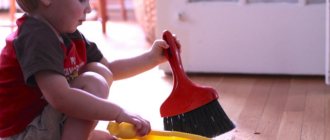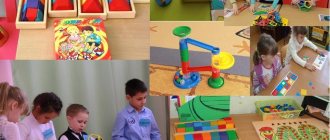The importance of labor education for the development of children
There are also objective problems that complicate the education of hard work in preschool children:
- Economic crisis, increasing family breakdown, migration of children from preschool institutions;
- Reduced attention of parents and educators to the formation of hard work (in comparison with the physical, mental, aesthetic development of the individual);
- The desire of preschool children for self-realization in a community of children with little social experience.
Thus, contradictions arose:
- Between the social significance of instilling hard work and the insufficient implementation of this pedagogical task in preschool institutions;
- Between the need to prepare a teacher or preschool teacher to develop hard work in children and the lack of theoretical foundations and organizational and pedagogical conditions for the development of this fundamental quality of a child.
In psychology and labor pedagogy, as in any other matter, there are still untapped reserves in the educational process. Teaching staff and sociologists are working to uncover them. In this regard, the science of psychology plays a special role. Psychological knowledge has already recognized the psychological patterns of teaching and upbringing, the formation of a child’s personality at different ages in different types of activities (play, learning, work), and generalized significant relationships in the field of pedagogical and psychological phenomena.
When organizing child labor, the age and individual characteristics of children and the patterns of their development should be taken into account. In the process of work, the aesthetic and physical are carried out. This organization of work must be ensured by the teacher. He must be a role model, learn the strengths and weaknesses of his students, organize events and much more.
The psychological aspect of a teacher’s activity in education through work lies in the influence of personal example, control of the influence of the environment on the individual and control of one’s work activity. The teacher must coordinate the content and forms of work with pedagogical goals, direct work activity in such a way that it requires students to demonstrate certain qualities, and evaluate the effectiveness of educational influences.
The role of the teacher is also to help the student increase his authority among his peers. Many students perform better in vocational education than in general education subjects. Therefore, the child has a need for recognition. When he achieves an increase in his authority, his activity in other activities increases. One of the main tasks of the teacher is to shape and direct this activity.
Taking into account the child’s role in the formation of his personality is also necessary, since he has his own needs, desires and interests. The discrepancy between the plans of adults and children explains the difficulties in education. Therefore, the main task of the teacher is to make the role of self-education in education as great as possible.
The formation of vital skills in preschool children is associated with activities aimed largely at satisfying everyday personal needs. Labor education of young children begins with self-service. Washing, dressing, etc. can be included in the content of labor education only to a limited extent, but the great educational significance and vital importance of the skills acquired by children in the process of self-service make it one of the important types of labor. Self-care involves simple routines that make washing and dressing easier.
With a properly organized pedagogical process, daily self-care work, in comparison with all other types of work, creates the most favorable conditions for the child to actively acquire the necessary skills and gain practical experience of independent behavior. This is one of the reasons for the wider use of this type of work in younger groups of kindergartens.
When assessing the educational value of self-care, we must first of all note its critical importance for meeting the child’s daily personal needs. Daily fulfillment of basic work tasks accustoms children to systematic work. Children begin to understand that every person has tasks related to the daily needs of life.
Labor education
Labor education is an important part of the education of the younger generation. N.K. Krupskaya in her works repeatedly emphasized the need to accustom children from an early age to the simplest types of work available to them, noting that in this way they become familiar with the properties of materials and learn to work with various tools. In their work, children show activity, ingenuity, perseverance, a desire for results, and they develop a desire to provide adults with all possible help.
The work activity of preschoolers is characterized by their interest in the real process of action. For example, after watering the plants, the child begins to water them again; Having placed a spoon for each plant on the table, he begins to lay out the second spoon. If there is no sufficient guidance for children, then work activity continues for a long time at the level of actions that are interesting to the child himself. Under the influence of the teacher, children gradually develop the ability to set goals, plan and organize their activities in advance (prepare everything necessary, determine the order of actions), and bring things to a result.
At work, children acquire a variety of skills and abilities that are necessary in everyday life: self-care, housekeeping, etc. Improving skills and abilities does not mean that the child begins to do without the help of adults. It develops self-confidence, the ability to overcome difficulties, and the ability to make volitional efforts. This brings him joy and a desire to learn new skills.
In the process of work, children practically study the properties of the things around them, observe the growth and changes of plants, examine animals, get acquainted with their living conditions, etc. They compare, contrast, and try to find the answer to the endless “whys” themselves. They develop their curiosity and educational interests. Work becomes an important means of children's intellectual development.
The work is physically taxing for children as they perform many outdoor activities (digging a garden bed, fetching water, shoveling snow, etc.). Children become able to show strength and overcome difficulties.
Labor activity is of particular importance for the formation of moral qualities. By completing simple tasks related to setting the table and preparing everything needed for lessons, children learn to be useful to others. This makes them ready to come to the aid of those who need them, willingly perform feasible work tasks, and develops a responsible attitude to work, hard work and attentiveness.
Preschool pedagogy identifies the following main tasks of labor education of children:
- Familiarization with the work of adults and instilling respect for it;
- Training in basic labor skills and abilities;
- Encouraging interest in work, hard work and independence;
- Encouraging socially oriented work motives and the ability to work in a group and for a team.
In kindergarten, in the family, in the social environment - everywhere the child encounters the work of adults and uses their results. Initially, children's attention is attracted only by external aspects: the process of labor activity, the movement of mechanisms, machines. Consistently introducing children to the work of adults in their immediate environment, and then outside the kindergarten, helps to form their understanding of the nature and meaning of work, and to explain to them, using specific examples, the attitude of adults to work and its social significance. The teacher explains to the children what a diligent person should be (one who works conscientiously and cares about completing the work), what it means to work well, to care for others, and reads to them works about work that convey its meaning and beauty in a clear and emotional form. By instilling in children respect for the working man and the desire to be like him, the teacher encourages them to take a careful attitude towards the results of their work.
The knowledge that preschoolers have about the work of adults should have a great influence on the formation of a correct attitude towards work, but it can remain formal if familiarity with work activity is not combined with child labor.
CHILDHOOD GUIDE
Pechnikova Nadezhda Yakovlevna, teacher of the Municipal Preschool Educational Institution No. 45, Murmansk
At preschool age, children receive their first ideas about the role of work in human life and society. At this age, they become acquainted with the labor and professional activities of adults, the world of professions, are included in feasible work activities in kindergarten and family, and acquire initial labor skills and work experience. The main goal of introducing children to the work of adults is to develop a respectful attitude towards work, the desire to work themselves and provide all possible assistance to others.
Modern educational programs for preschoolers provide for the formation of ideas about the work of adults. When carrying out work to familiarize preschoolers with the work of adults, it is necessary to take into account : - the age of the children; — the specifics of the course of mental processes; - conditions existing in the immediate social environment. The work of a kindergarten has its own difficulties in the implementation of labor education : a significant part of the work of adults does not take place in front of children, and the possibilities of observing the work of adults are limited.
Therefore, the most effective methods of familiarizing adults with the work are observations of the labor process, excursions, conversations and meetings with representatives of professions that provide the greatest clarity of ideas and the maximum effectiveness of the knowledge acquired by children. In the process of further conversations, through the teacher’s stories, the information obtained during observations is clarified, consolidated, and supplemented.
The formation of children's systemic knowledge about the work of adults involves familiarizing preschoolers with specific labor processes and transforming a person's subject of labor into a product (the result of labor). Systematic knowledge about labor makes it possible for older preschoolers to establish a connection between the result of labor and money.
One of the effective means of solving problems of forming ideas about professions are didactic games . They form in children respect for the working person, arouse interest in the work of adults, and a desire to work themselves. By conducting didactic games with preschoolers aimed at developing ideas about the profession, knowledge about the world of work and professions is systematized.
The use of modeling technology as a means of developing a variety of knowledge and skills has a positive impact on the intellectual development of children. The basics of modeling are formed in preschool age, growing out of substitutions in play and productive activities. Thus, by acting out a particular plot in a game, children model the relationships between adults, and with the help of objects used as game substitutes, they create models that reflect the relationships of real objects and actions.
The pedagogical technology of using modeling is very effective; it allows the child to clearly see the sequence of inclusion of components in the labor process, to understand the connections and dependencies that exist between them. In developing children's systematic knowledge about the work of adults, subject-schematic models are used. Here, essential components and connections between them are indicated using substitute objects and graphic signs. The model simplifies the object, represents only its individual aspects, and therefore, without presenting a general idea of the profession, it is impossible to consider the structure of the labor process.
In the second junior group of the kindergarten, children begin to familiarize themselves with the professions of the kindergarten staff, that is, with the professions of the children’s immediate environment . At the same time, you can introduce children to a schematic representation of the profession, thereby preparing children to perceive a subject-schematic representation of the structure of the labor process. For example, in the game “City Travel”, children are asked to determine from the images where and what is located (pharmacy, post office, bakery, etc.). Then the game becomes more complicated, the children select the pictures themselves, following the adult’s suggestion - to guess how they can show that in this house there is a pharmacy, a lock repair shop, a dairy store, etc. The forms of organization of such games can be different: individual, group. You can offer children creative productive activities : drawing, depicting this or that object with signs, sticking a model from ready-made signs, designing. Next, you should introduce children to the fact that a schematic image can indicate not only objects, but also actions.
Children of senior preschool age learn to replace subject-schematic models with a schematic model . Now each component of labor is presented in the form of one schematic picture indicating the labor process. So, for example: the target is a star; the subject of work is a schematic representation of the material; labor tools - a schematic representation of any instrument of labor; the order of labor actions is replaced by a schematic image of a hand and the result of labor. At this age, children’s knowledge about professions also becomes more complicated: now children become more familiar with professions and their work components that are remote from the children’s environment , for example, fireman, teacher, veterinarian, etc.
Indicators of knowledge about the work of adults are the components of social labor experience: - the presence of knowledge about the work of adults; — the ability to highlight the result of labor in each labor process; — the ability to identify connections and dependencies between the components of labor; - ability to analyze one’s own work activity.
Long-term planning for introducing adults to work in the second junior group
September - introduction to the profession of “teacher assistant”. Contents of the work: conversation about the work of an assistant teacher; drawing “Apron for our nanny.”
October - introduction to the profession of "cook". Contents of the work: excursion to the kitchen; role-playing game “We will cook you lunch” (using items for their intended purpose).
November - introduction to the nursing profession. Contents of the work: excursion to the medical office; didactic game “The girl got sick.”
December - introduction to the profession of a tailor. Contents of the work: didactic game “Tailor”.
January - introduction to the profession of “salesman”. Contents of the work: role-playing game “Shop”.
February - introduction to the profession of a janitor. Contents of the work: observing the work of a janitor on the site.
March - introduction to the profession of a driver. Contents of the work: outdoor game “Cars”; didactic game “Where are the cars going?”
April - introduction to the construction profession. Contents of the work: role-playing game “Building a house for Cheburashka.”
May - introduction to the profession of hairdresser. Contents of the work: role-playing game “Barbershop”.
Features of familiarizing preschool children with the work of adults Formation of elementary mathematical concepts in older preschoolers through didactic games Formation of a healthy lifestyle of preschoolers in the process of physical education and learning activities Formation of sensory concepts in young children >
Pedagogical approaches to the formation of ideas about adult work in preschool children
Analysis of psychological and pedagogical literature allowed us to identify different approaches to the problem of developing ideas about the work of adults.
N.K. Krupskaya, directing educators to broaden the horizons of children, pointed out that the main source of impressions of preschoolers is their immediate environment, the public sphere in which they live. But not everything that surrounds a child is educationally equal. Therefore, from a pedagogical point of view, it is very important to make the right choice of objects to tell children about.
Further, the role of the immediate environment was emphasized in the works of R.O. Zhukovskaya, S.A. Kozlova, T.A. Markova et al. experimentally proved it.
The formation of a positive attitude towards the work of adults is facilitated by the independent work of children. V.A. Sukhomlinsky wrote: “Patriotic beliefs are strengthened in the minds of children only when the child with his own hands creates something necessary and useful for the people, experiences his activities, his work as a struggle to increase the wealth of the fatherland.
In the works of R.S. Bure, G.N. Godina, the main component of work activity is socially significant motivation, and therefore the method of involving children in work activity is justified by demonstrating the importance and value of the process and result of work. In the study by D.V. Sergeeva systematically shows the methodology for organizing manual labor, its moral and aesthetic value in the education of preschool children. In preschool pedagogy, a scientific school is distinguished, which shows the role of knowledge and ideas about the work of adults in the life of a preschool child.
In the works of V.I. Loginova, G.G. Samorukova’s acquaintance with the labor of adults is built on the basis of cause-and-effect relationships: Transformation of the subject of labor in the labor process into its product.
In the works of T.A. Markova, V.G. Nechaeva shows the role of ideas about the work of adults in the aspect of the formation of personal qualities: Diligence, care, attention, etc., and reveals the method of forming ideas. This includes ethical conversations, looking at pictures, creating problem situations, etc. These scientists emphasize the role of field trips, which clearly show the possibility of introducing children to professions.
In the work of A.M. Vinogradova emphasizes the need to support and develop a child’s interest in the work of adults. For this purpose, field trips, walks, observations, conversations, and reading fiction are organized. With the help of specific visual examples, it is important to convey to children an understanding of existing concepts (all work is worthy of honor; the work of people is interconnected and serves the common good; work is respected; respect for work is manifested in caring for what is made by human hands), as well as as much as possible involve the youngest family member in the affairs of adults.
It is obvious that the work of kindergarten teachers to familiarize children with the work of adults cannot bring the desired results without appropriate explanatory work with parents. It is important to convey to parents that the child’s acquaintance with their work is a factor of great educational importance, that the child, knowing who the father and mother work, is imbued with special respect for them, and that at the same time their authority in the eyes of the growing person increases. The educational effect of work increases when the child shows interest in it. Introducing a child to the work of adults is one of the sources of instilling in him a caring attitude towards the common good.
According to T.A. Markova, R.S. Bure, frugality is formed from the right attitude towards the work of other people. It is important that the child is convinced from his own experience of the greatest benefits of work for others. Makarenko said: “Your child will be a member of a working society, so his value in this society, his value as a citizen will depend entirely on how he can participate in public work, how he will be prepared for this work.
Project to familiarize adults with labor in the senior group “Kaleidoscope of Professions”
author: Zamorova Marina Igorevna
Teacher Private preschool educational institution Kindergarten No. 2 of the open joint-stock company "Russian Railways"
Project to familiarize adults with labor in the senior group “Kaleidoscope of Professions”
Project to familiarize adults with labor in the senior group “Kaleidoscope of Professions”
Zamorova Marina Igorevna
Relevance of the project
In older preschool age, further familiarization with the world of adults and the objects created by their labor acquires particular importance for the full development of the child’s personality.
The origins of labor education lie in preschool age, when the child first begins to feel the need for independent activity, declaring his intentions and showing himself to be the subject of his desires and interests. Fostering this need is one of the central tasks of children’s labor education.
Labor education ensures the comprehensive development of the personality of preschool children through familiarization with the work of adults and the introduction of children to accessible work activities.
Familiarization with the professions of parents ensures the child’s further entry into the modern world, familiarization with its values, and ensures the development of the cognitive interests of children of senior preschool age. That's why the idea of creating this project arose. An in-depth study of professions, including through the professions of one’s parents, contributes to the development of ideas about their significance, the value of each work, and the development of evidence-based speech. The right choice of profession determines success in life.
Project type
: informational, group, joint, long-term (6 months)
Objective of the project:
creating conditions for expanding children’s ideas about professions, including the professions of their parents.
Project participants
: group pupils, parents, kindergarten staff, teachers.
Project implementation stages:
- Preparatory stage: collection of information and material for the implementation of the project idea.
- The main stage: achieving the intended goals.
III. Summarizing:
- Card index of games on the theme “Professions”;
- Presentation of the project at the pedagogical council.
Tasks:
- To form holistic ideas of preschoolers about the professions of their parents, to emphasize the significance of their work
- Develop the prerequisites for a responsible attitude towards the assigned work and communication skills.
- Cultivate a positive attitude towards work and a desire to work.
Main directions of the project:
- Organization of direct educational activities;
- Equipment for a subject-development environment;
- Working with parents.
Expected Result
:
- to arouse interest in the surrounding world;
- to expand children’s knowledge and ideas about professions, including the professions of their parents (parents’ place of work, the significance of their work; pride and respect for the work of their parents);
-help parents properly organize joint family leisure;
- assign children feasible work responsibilities at home, in kindergarten, and bear responsibility for their implementation;
- to ensure the child’s activity in the complex process of his becoming a Human.
Long-term planning for introducing adults to work in the senior group
September
-Meetings with people of different professions: teacher;
-Work with the presentation “All professions are needed, all professions are important”;
- Lesson “Laundress work of adults”.
Tasks:
To form ideas about kindergarten employees (laundress, about the labor processes performed by her, tools of labor; to develop children’s cognitive interest in the work of adults; to cultivate a respectful attitude towards the work of adults, a desire to provide all possible assistance; to clarify and generalize children’s ideas about professions.
October
-Meetings with people of different professions: dentist;
-Observing the work of the nanny;
-Conversation “The work of a music director”;
-solving riddles about professions.
Tasks:
To clarify children’s ideas about the profession of a doctor or musician; give specific ideas to the children: the nanny cleans the carpet with a vacuum cleaner, cleans the sinks with paste, washes the windows, door, etc. note the conscientious attitude of adults to their work; To form children’s ideas about the profession of a music director, to develop children’s interest in the work of a music director; pay attention to the fact that the teacher and music director are working together.
November
-Meetings with interesting people of different professions: policeman;
-Lesson on speech development “In the world of professions”;
-learning proverbs and sayings about professions;
-targeted visit to the kitchen.
Tasks
: - consolidate children’s knowledge about professions (doctor, driver, salesman, teacher, postman, etc., about tools; develop the ability to compose a coherent story using a diagram; learn the poem “My Bear” using a mnemonic table.
-Develop speech, observation, intelligence, and the ability to correlate a picture with a symbol.
-Cultivate interest in various professions.
-Expand your understanding of the police profession.
-Give specific ideas to the children: the cook makes minced meat using an electric meat grinder, makes cutlets, pies, cuts vegetables using a vegetable cutter, prepares some dish - pilaf, meatballs. Introduce children to household appliances that make the cook’s work easier. Cultivate respect for the work of adults and the results of their work.
December
-Meetings with interesting people of different professions: veterinarian;
-project “Sweet Fairy Tale” (confectioner).
Tasks:
Introduce children to the profession of a veterinarian.
-Introduce children to the profession of a confectioner, to his professional actions, and to helper objects;
January
-Meetings with interesting people of different professions: nurse
- Supervising the work of a nurse.
-Circus professions: role-playing game “Circus”.
Tasks:
Consolidate performances: listens with a phonendoscope, measures temperature, gives medicine, smears abrasions, makes bandages, instills medicine, measures temperature, height, keeps notes in a card. Enter into the active dictionary: bandage, pipette, thermometer, tablet, ointment, brilliant green, stadiometer, scales, medical record. Using the example of adult work to cultivate mutual assistance, humane feelings, and respect for each other.
— To give an idea of people of complex circus art: a juggler (who throws several objects at once and manages to catch them on the fly); acrobat (delights spectators with flights under the circus dome); trainer (works with various animals, large predators, birds, sea inhabitants; teaches them to dance, jump through hoops, etc.); clown (makes everyone laugh, entertains); magician (performer of mysterious tricks). To develop in children a cognitive interest in people of different professions. Cultivate a respectful attitude towards creative people.
February
-Meetings with people of different professions: salesperson
-Conversation “Military Profession” (guest);
-Targeted visits to children with parents at the post office. Role-playing game “The postman brought a parcel.” Watching the film “Three from Prostokvashino”.
Tasks
:Repeat with children the material about the profession of a salesperson;
— Clarify children’s ideas about the profession of fathers and grandfathers; about the military profession. To form ideas about the features of military service: soldiers train to be strong, skillful, learn to shoot accurately, and overcome obstacles. The military is a very honorable profession, they are the defenders of our Motherland; Many books have been written about the military and many interesting films have been made. To instill in children a desire to bring joy to their father (grandfather) and give gifts.
— Introduce children to the work of a postman: the postman delivers correspondence to homes. He puts it in mailboxes. But first, he sorts the correspondence and writes down the numbers of houses and apartments. To do this, the postman comes to work very early. The job of a postman is difficult and very necessary. To instill in children a sense of respect for working people.
March
- Meetings with people of different professions: worker
— A conversation about the profession of a baker.
— Role-playing game “How bread is made”;
— Virtual tour “Elevator”;
Tasks:
— develop children’s horizons about the baker’s profession;
— introduce the elevator employees.
- Conversation “Who works in the theater?”
Target:
— To introduce the features of the extraordinary profession of an artist. The main thing in an artist’s work is the ability to transform into another person during a performance. Make-up artists help in the artist's work - they change the actor's appearance with the help of make-up paints, adhesive mustaches, beards, ears, masks and wigs. Costumer – selects costumes for the actors that will match the character and stage image of the characters; Costume is one of the most important components of the performance design.
April
-Excursion to the children's library. Profession: librarian.
-Meeting with interesting people of different professions: driver
-Conversation about the profession of astronaut.
Tasks:
-Form ideas about the driver’s profession; drives the car, unloads cargo, puts the car in order, fills water, repairs - inflates, changes the tire. The driver must know the rules of the road well; to become a driver you need to study;
— Introduce children to the work of a librarian: gives out books; communicates with the reader, answers his questions, advises which book to read; talks about children's writers and their new books. A librarian must have excellent memory, self-control, listening skills, tact and attentiveness to the reader.
— Give children an idea of the profession of an astronaut. They carry out a lot of research work in space: they study the climate of the Earth, other planets, how plants behave in zero gravity. An astronaut must be perfectly physically developed, educated, persistent and fearless.
May
-Meetings with interesting people of different professions: “The world of my hobbies”
-The work of rescuers and firefighters.
— Observing the work of adults in landscaping, painting, landscaping, and cleaning.
— Labor of agricultural workers: gardener, beekeeper, livestock breeder, milkmaid, winegrower, rabbit breeder
Tasks
— To introduce the peculiarities of the rescuer profession - fearless people find themselves in the most dangerous places on our planet, saving people’s lives during hurricanes, storms, and avalanches. Deepen your knowledge of the firefighter profession. Rescuers and firefighters are fearless, strong, trained, selfless.
-Formulate children’s ideas about the work and professions of their mothers; to cultivate a desire to provide all possible assistance to the mother, to take care, to bring joy with her actions and actions.
— Develop observation skills, the ability to reflect your impressions of the work of adults in play activities.
— Expand knowledge about the work of people living in rural areas, introduce people to seasonal work (in the spring they plow the land, sow grain, plant vegetables, shrubs, trees; in the summer they work in the fields, in gardens, in haymaking; in winter they grow seedlings in greenhouses) to deepen children's knowledge about the work of a milkmaid - they use modern equipment in their work: electric drinking bowls, electric milking machines. On the advice of a veterinarian, a special diet is selected for the cow: vitamins, food additives. Activation of the dictionary: cow, hay, milking machine, milking, milk, feed.
Holiday for children “World of Professions”.
Project presentation.
Project Implementation Report
The work carried out contributed to the enrichment of children with new information in the field of history, biology, and geography. Reading works of educational literature broadened the horizons of children. Many preschoolers learned about the metro, the semaphore, the railroad, and different cities. In the process of such activities, children discovered new words for themselves. Didactic games, conversations and lexical exercises contributed to the consolidation of new words in speech.
During the monitoring, the following groups of children were identified:
- children with a high level of development of ideas about professions - 4 children (40%). These children were able to name most professions, explained to whom what was needed for work, named the tools and the result;
— with an average level of development of ideas about professions — 6 children (60%). In general, these children improved their understanding of professions and were able to name up to 5 professions, but required the help of an adult;
— with a low level of development of ideas about professions were not identified.
So, during the monitoring, it was found that already 60% (from 20%) of children have a high level of formed ideas about the work of adults, 40% of children have an average level, and no children with a low level have been identified. Monitoring the knowledge of preschoolers about professions revealed that already 40% of children (from 10%) have a high level of formation of ideas about professions, 60% of children have an average level, a low level has not been identified. The results obtained indicate the effectiveness of the work carried out to form preschoolers’ ideas about the work of adults.
List of used literature
- Aleshina N.V. Familiarization of preschoolers with the environment / N.V. Aleshina. - M.: “Pedagogical Society of Russia”, 2000.- 128 p.
- Arushanova A.G. On the problem of determining the level of speech development of a preschooler // Problems of speech development of preschoolers and junior schoolchildren. M.: Institute of National Science. problems of education MORF, 1993.
- Baranova N. A., Guguman T. V., Popova V. F., Romanenko O. G. Acquaintance of preschoolers with the professional activities of adults // Young scientist. - 2015. - No. 7. - pp. 731-734.
- Bure R.S. Preschooler and work. Theory and methodology of labor education. M.: Mozaika-Sintez, 2011. 136 p.
- Bure R.S. Social and moral education of preschool children. For classes with children 3-7 years old. – M.: Mosaika-Sintez, 2012.- 80 p.
Project to familiarize adults with labor in the senior group “Kaleidoscope of Professions”






